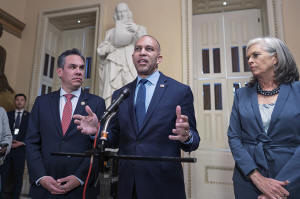House passes bill to fund federal agencies through September, though
prospects unclear in Senate
[March 12, 2025]
By KEVIN FREKING
WASHINGTON (AP) — The House passed legislation Tuesday to avert a
partial government shutdown and fund federal agencies through September,
providing critical momentum as the measure now moves to the Senate,
where bipartisan support will be needed to get it over the finish line.
Republicans needed overwhelming support from their members to pass the
funding measure, and they got it in the 217-213 House vote. Just one
Republican, Rep. Thomas Massie of Kentucky, voted against the measure.
And just one Democratic lawmaker, Rep. Jared Golden of Maine, voted for
it.
In the Senate, they'll need support from at least eight Democrats to get
the bill to President Donald Trump’s desk. It's one of the biggest
legislative tests so far of the Republican president's second term,
prompting Vice President JD Vance to visit Capitol Hill on Tuesday
morning to rally support.
Speaker Mike Johnson, R-La., moved ahead on the bill, essentially daring
Democrats to oppose it and risk a shutdown that would begin Saturday if
lawmakers failed to act on the continuing resolution, often referred to
by lawmakers as a CR.
“We did our job today," Johnson said moments after the vote.
Johnson's strategy had the backing of Trump, who called on Republicans
to “remain UNITED — NO DISSENT — Fight for another day when the timing
is right.”
Lawmakers said the bill would trim $13 billion in non-defense spending
from the levels in the 2024 budget year and increase defense spending by
$6 billion, which are rather flat changes for both categories when
compared with an overall topline of nearly $1.7 trillion in
discretionary spending. The bill does not cover the majority of
government spending, including Social Security and Medicare. Funding for
those two programs is on autopilot and not regularly reviewed by
Congress.

Democrats mostly worried about the discretion the bill gives the Trump
administration on spending decisions. They are already alarmed by the
administration's efforts to make major cuts through the Department of
Government Efficiency, or DOGE, run by billionaire Trump adviser Elon
Musk. And they say the spending bill would fuel the effort.
Spending bills typically come with specific funding directives for key
programs, but hundreds of those directives fall away under the
legislation. So the administration will have more leeway to reshape
priorities.
For example, a Democratic memo said the bill would allow the
administration to steer money away from combating fentanyl and instead
use it on mass deportation initiatives.
"It is not a simple stopgap that keeps the lights on and the doors
open," said Rep. Rosa DeLauro, the top Democrat on the House
Appropriations Committee. “This is Republican leadership handing over
the keys of the government, and a blank check to Elon Musk and to
President Trump.”
Rep. Tom Cole, the Republican chairman of the House Appropriations
Committee, acknowledged the continuing resolution was not the outcome he
sought but said it was time to end the cycle of short-term funding
extensions. This will be the third in recent months. He blamed Democrats
for trying to rein in Trump’s authority on spending.
“We’re not going to have a Republican Senate and a Republican House
restrict a Republican president from the legitimate exercise of
executive authority," Cole said. "And then, oh, by the way, ask him to
sign the bill.”
Normally, when it comes to keeping the government fully open for
business, Republicans have had to work with Democrats to craft a
bipartisan measure that both sides can support. That’s because
Republicans almost always lack the votes to pass spending extensions on
their own.
[to top of second column]
|

House Minority Leader Hakeem Jeffries, D-N.Y., center, flanked by
Rep. Pete Aguilar, D-Calif., left, and Rep. Katherine Clark,
D-Mass., the House minority whip, speaks to reporters outside the
House chamber as Republicans prepare a spending bill that would keep
federal agencies funded through Sept. 30, at the Capitol, in
Washington, Monday, March 10, 2025. (AP Photo/J. Scott Applewhite)

Rep. Andy Harris, R-Md., and chairman of the House Freedom Caucus,
the most conservative wing of the Republican conference, said he
supported this one because it would cut spending and not lead to a
massive, catch-all spending bill, which has become the norm over the
years.
"This is not your grandfather’s continuing resolution," Harris said.
Massie was still a holdout, though, despite Trump going after him on
social media, calling him a “GRANDSTANDER, who’s too much trouble.”
"HE SHOULD BE PRIMARIED, and I will lead the charge against him,"
Trump posted online.
Massie responded by saying Trump was “attacking me and Canada today.
The difference is: Canada will eventually cave.”
House Democratic leaders came out strongly against the legislation.
Less clear was how strongly they would push members in competitive
battleground districts to follow their lead. In the end, they held
the entire caucus together with the exception of Golden.
“This Republican shutdown bill does nothing to enhance the American
dream. It undermines it,” House Democratic leader Hakeem Jeffries,
D-N.Y., said ahead of the vote.
Democratic leaders in the Senate generally seemed to be emphasizing
patience at this stage and were waiting to see if Republicans can
muscle the bill through the House before taking a stand.
“We're going to see what the House does first,” said top Democratic
Sen. Chuck Schumer of New York.
Still, several rank-and-file Democrats criticized the measure. Sen.
Cory Booker of New Jersey said he was stunned that Republicans were
“trying to jam through something that is their way or the highway.”
Democrats also introduced an alternative bill Monday night funding
the government through April 11. The bill could serve as a Plan B if
the GOP-led effort falters.
Both parties were prepared to blame the other if the bill failed.
“It looks like they're going to try to shut down the government,”
Johnson said of Democrats.

“If the government shuts down with a Republican House, Republican
Senate and Republican president, it will be solely because the
Republicans have moved forward with a terrible, partisan,
take-it-or-leave-it bill,” said Rep. Dan Goldman, D-N.Y.
The spending bill could also have major ramifications for the
District of Columbia's government.
Mayor Muriel Bowser, a Democrat, said the proposal would require the
district to cut $1.1 billion in spending in the next six months
since it has already passed a balanced budget and is midway through
its fiscal year. That means, officials said, cuts to critical
services such as education and public safety.
__
Associated Press writers Leah Askarinam, Gary Fields and Lisa
Mascaro contributed to this report.
All contents © copyright 2025 Associated Press. All rights reserved |